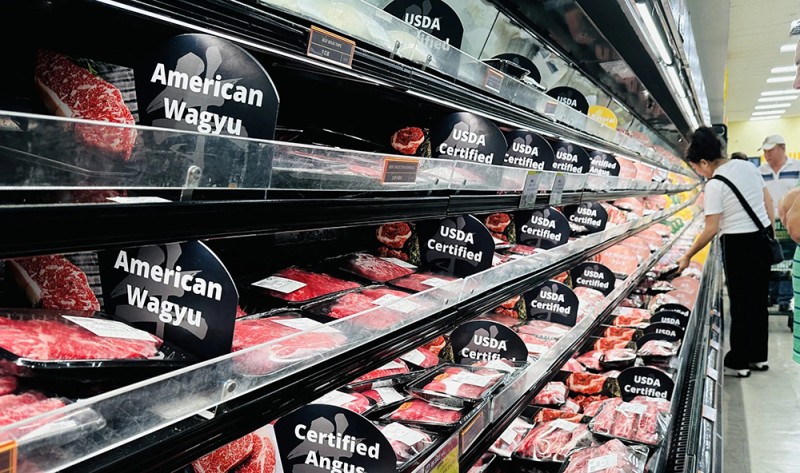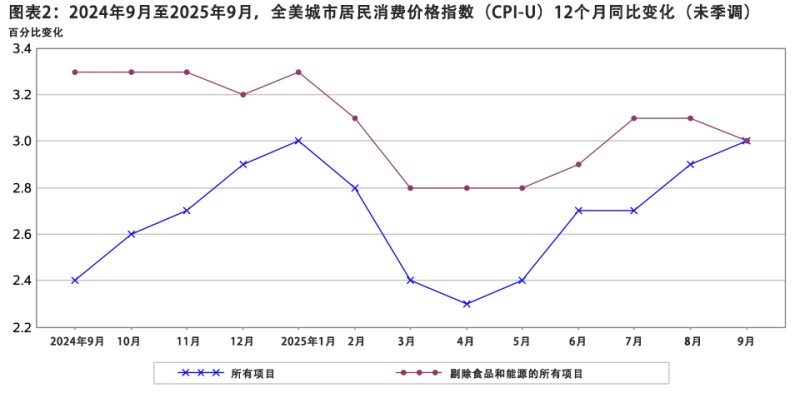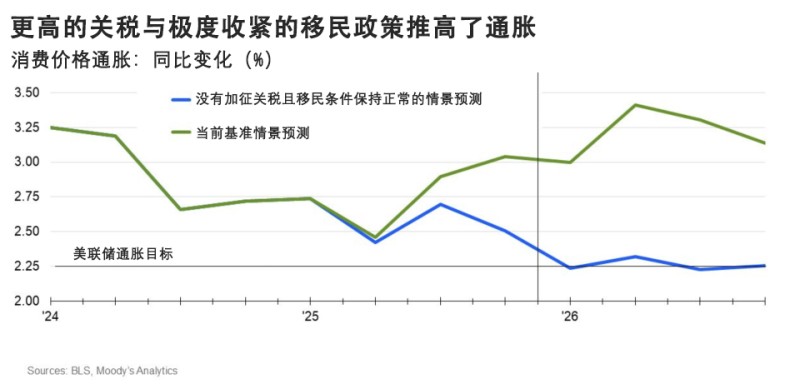
穆迪分析(Moody’s Analytics)首席经济学家马克·赞迪表示惋惜:若非总统唐纳德·特朗普在贸易和移民问题上发起攻势,美国经济本可以是另一番景象。
他在周日的一则社交媒体帖文中指出,自疫情以来美国物价一路飙升,如今仍以“令人不安的步伐快速”上涨,全美正陷入一场可负担性危机。
赞迪写道:“消费价格通胀水平接近3%,远高于美联储的通胀目标。所有迹象都表明,通胀将进一步抬升,而这种局面本可避免。”
诚然,通胀自2022年触及9%的高位后已大幅回落,而特朗普政府加征的关税也未像预期那样大幅推升物价。但自4月份美国对全球加征关税以来,年通胀率仍在持续走高。
美国劳工统计局(Bureau of Labor Statistics)的最新数据显示,9月总体消费价格指数(CPI)同比上涨3%,高于4月2.3%的年增速,通胀明显加快。

4月之前,美国通胀一直呈下降趋势,有望逐步回落至美联储2%的目标。
赞迪补充道:“但更高的关税、极度收紧的移民政策,以及更广泛的去全球化趋势,彻底打乱了这一前景。在可预见的未来,通胀恐怕都将维持在较高的水平。”
他指出:“高通胀叠加就业市场岗位增长乏力、失业率攀升以及工资增速放缓,意味着美国中低收入群体面临的财务困境仍将持续。”
根据随附的图表,赞迪预计明年通胀将进一步攀升至接近3.5%,随后略有回落,但仍维持在3%以上。
相比之下,如果特朗普没有加征关税,且移民条件保持正常,到2026年,美国通胀将维持在约2.25%的水平。

与此同时,尽管特朗普政府坚称物价已得到控制,但已取消对咖啡、水果和牛肉等民生食品的部分关税。
在本周日接受NBC《会见新闻界》(Meet the Press)节目克里斯汀·韦尔克采访时,财政部长斯科特·贝森特坚持认为,自4月以来通胀并未恶化,尽管数据显示事实恰恰相反。
他说道:“所以通胀并没有加剧。 克里斯汀,我们不会像拜登政府那样,去否认美国民众的真实感受。”
贝森特补充说,进口商品并非通胀的推手,通胀的根源在于服务类价格的持续上涨,而这些服务并没有受到关税的直接影响。
他还预测,能源价格下跌,将有助于缓解其他品类的物价压力,而特朗普政府近期与主要经济体达成的贸易协议,将在未来数周和数月内推动更多商品价格下行。
贝森特表示,根据《大而美法案》(One Big Beautiful Bill Act),明年实施的减税措施将提高美国民众的实际收入,从而改善整体可负担性。
他表示:“我对2026年的经济前景充满信心。我们已经为实现强劲且无通胀的经济增长奠定了基础。”(*)
译者:郝秀
审校:汪皓
穆迪分析(Moody’s Analytics)首席经济学家马克·赞迪表示惋惜:若非总统唐纳德·特朗普在贸易和移民问题上发起攻势,美国经济本可以是另一番景象。
他在周日的一则社交媒体帖文中指出,自疫情以来美国物价一路飙升,如今仍以“令人不安的步伐快速”上涨,全美正陷入一场可负担性危机。
赞迪写道:“消费价格通胀水平接近3%,远高于美联储的通胀目标。所有迹象都表明,通胀将进一步抬升,而这种局面本可避免。”
诚然,通胀自2022年触及9%的高位后已大幅回落,而特朗普政府加征的关税也未像预期那样大幅推升物价。但自4月份美国对全球加征关税以来,年通胀率仍在持续走高。
美国劳工统计局(Bureau of Labor Statistics)的最新数据显示,9月总体消费价格指数(CPI)同比上涨3%,高于4月2.3%的年增速,通胀明显加快。
4月之前,美国通胀一直呈下降趋势,有望逐步回落至美联储2%的目标。
赞迪补充道:“但更高的关税、极度收紧的移民政策,以及更广泛的去全球化趋势,彻底打乱了这一前景。在可预见的未来,通胀恐怕都将维持在较高的水平。”
他指出:“高通胀叠加就业市场岗位增长乏力、失业率攀升以及工资增速放缓,意味着美国中低收入群体面临的财务困境仍将持续。”
根据随附的图表,赞迪预计明年通胀将进一步攀升至接近3.5%,随后略有回落,但仍维持在3%以上。
相比之下,如果特朗普没有加征关税,且移民条件保持正常,到2026年,美国通胀将维持在约2.25%的水平。
与此同时,尽管特朗普政府坚称物价已得到控制,但已取消对咖啡、水果和牛肉等民生食品的部分关税。
在本周日接受NBC《会见新闻界》(Meet the Press)节目克里斯汀·韦尔克采访时,财政部长斯科特·贝森特坚持认为,自4月以来通胀并未恶化,尽管数据显示事实恰恰相反。
他说道:“所以通胀并没有加剧。 克里斯汀,我们不会像拜登政府那样,去否认美国民众的真实感受。”
贝森特补充说,进口商品并非通胀的推手,通胀的根源在于服务类价格的持续上涨,而这些服务并没有受到关税的直接影响。
他还预测,能源价格下跌,将有助于缓解其他品类的物价压力,而特朗普政府近期与主要经济体达成的贸易协议,将在未来数周和数月内推动更多商品价格下行。
贝森特表示,根据《大而美法案》(One Big Beautiful Bill Act),明年实施的减税措施将提高美国民众的实际收入,从而改善整体可负担性。
他表示:“我对2026年的经济前景充满信心。我们已经为实现强劲且无通胀的经济增长奠定了基础。”(*)
译者:郝秀
审校:汪皓
Moody’s Analytics chief economist Mark Zandi lamented what could’ve been, if President Donald Trump hadn’t waged war on trade and immigration.
In a social media post on Sunday, he noted that prices have surged since the pandemic and are continuing to climb at an “uncomfortably quick pace,” with the country now suffering an affordability crisis.
“Consumer price inflation is near 3%, well above the Fed’s inflation target, and everything points to even higher inflation dead-ahead,” Zandi said. “It didn’t have to be this way.”
To be sure, inflation has cooled sharply since hitting 9% in 2022, and Trump’s tariffs haven’t stoked inflation as much as anticipated. But the annual rate has still marched higher since he imposed global tariffs in April.
The most recent data from the Bureau of Labor Statistics show that the overall consumer price index was up 3% in September from a year ago, accelerating from an annual rate of 2.3% in April.
Before April, inflation was following a downward trajectory that was on track to slowing back to the Federal Reserve’s 2% target.
“But higher tariffs, highly restrictive immigration policy, and de-globalization more broadly have upended that outlook, and inflation appears likely to remain stubbornly high for the foreseeable future,” Zandi added.
“The high inflation, combined with a job market struggling to create jobs, rising unemployment, and slowing wage growth, means that the tough financial times low- and middle-income Americans are grappling with will continue on.”
In an accompanying chart, he sees inflation heating up even more next year to nearly 3.5% then easing a bit—but remaining above 3%.
By contrast, an alternate scenario without Trump’s tariffs and under normal immigration conditions would send inflation hovering around 2.25% through 2026.
Meanwhile, the Trump administration insists that prices are under control, but has also rolled back certain tariffs on grocery staples like coffee, fruits and beef.
In an interview Sunday on NBC’s Meet the Press with Kristen Welker, Treasury Secretary Scott Bessent was adamant that inflation hasn’t worsened since April, despite the data showing it has.
“So inflation hasn’t gone up,” he said. “And Kristen, the one thing that we’re not going to do is do what the Biden administration did and tell the American people they don’t know how they feel.”
Bessent added that imported goods aren’t contributing to inflation and that services, which aren’t directly impacted by tariffs, are fueling it instead.
At the same time, lower energy prices should help ease pressure in other categories while trade deals Trump has reached with top economies will bring other prices down in the coming weeks and months, he predicted.
And lower taxes next year under the One Big Beautiful Bill Act will increase take-home pay for Americans, boosting overall affordability, Bessent said.
“I am very, very optimistic on 2026. We have set the table for a very strong non-inflationary growth economy,” he added.

